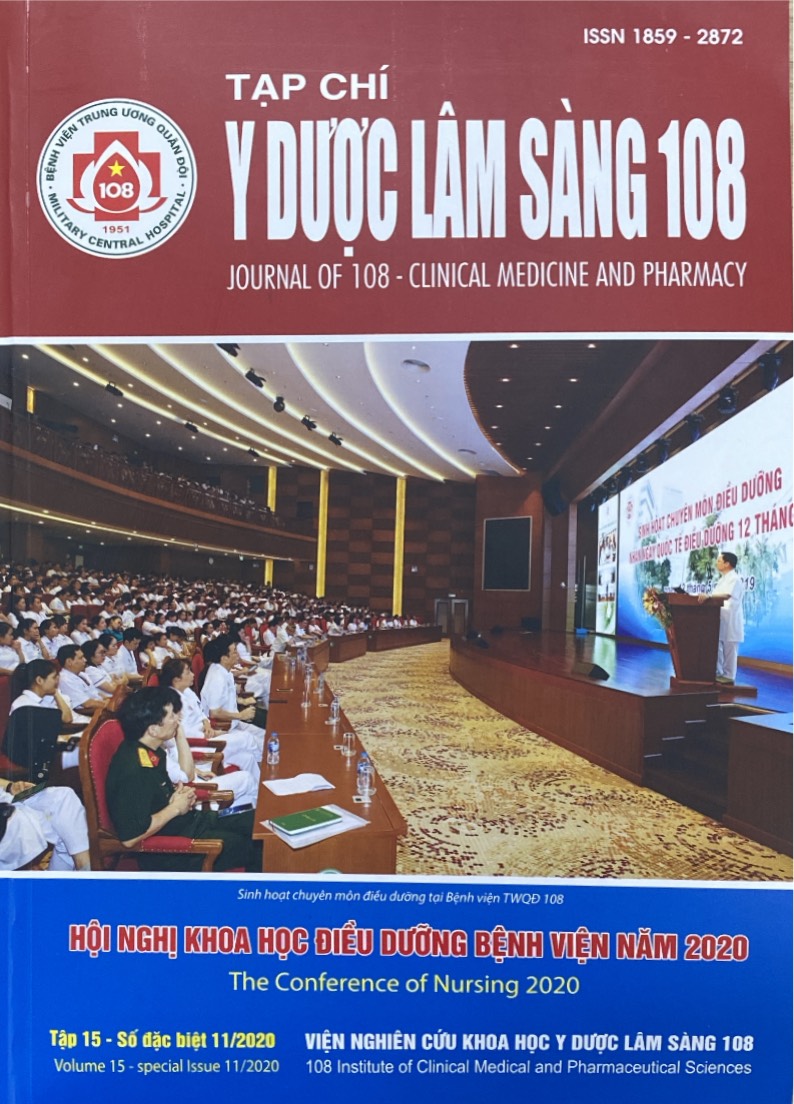Quality of life after surgical treatment of hepato-biliary and pancreatic cancer
Main Article Content
Keywords
Abstract
Objective: To describe the quality of life and related factors after surgical treatment of hepato-biliary and pancreatic cancer. Subject and method: A descriptive cross-sectional study on 102 patients who underwent surgery at Hepato-Biliary and Pancreatic Department in 108 Military Central Hospital from August 2018 to June 2020. The FACT-HEP was used in this study. Result: Mean age was 57.7 ± 12.5 years. Male/female: 3/1. The proportion of patients in stage II and stage III was 32.3%. The total score of FACT-Hep was 127.8 ± 13.3 (max 180) points. The mean score about social/family wellbeing 20.5 ± 3.32, functional wellbeing 19.3 ± 3.41; emotional wellbeing 16.6 ± 4.36, physical wellbeing 18.2 ± 4.12, and Hepatobiliary cancer subscale 53.2 ± 6.27. Related factors in patients’quality of life after surgery were the post-day hospital, cancer organs, and cancer stage. Furthermore, 96.1% losing weight and 91.2% mouth being dry. Conclusion: The quality of life after surgery in hepato-biliary and pancreatic cancer was average. The factors associated with the quality of life were the post-day hospital, cancer organs, and cancer stage
Article Details
References
2. Trần Thị Huyền Nga, Đào Văn Long (2015) Đánh giá chất lượng cuộc sống của bệnh nhân ung thư tế bào gan bằng bộ câu hỏi FACT - HEP. Luận văn tốt nghiệp bác sỹ nội trú chuyên ngành Nội khoa, mã số NT 62722050, Trường Đại học Y Hà Nội.
3. Phạm Quỳnh Giang, Cao Đức Tiến (2012) Nghiên cứu đặc điểm lâm sàng rối loạn trầm cảm và lo âu ở người bệnh ung thư dạ dày. Tạp chí Ung thư Việt Nam; số 2, tr. 261-265.
4. American Joint Committee on Cancer (AJCC) TNM Staging for Hepatocellular cancer (8th ed., 2017).
5. Economist Intelligence Unit (EIU) World Cancer Initiative 2018.
6. FACIT Measurement system, [online] Available at: http://www.facit.org/FACITOrg/AboutUs [Accessed 13 November 2016]
7. Stell JL, Chopra K, Olek MC et al (2007) Health-related quality of life: Hepatocellular carcinoma, chronic liver disease, and the general populatio. Quality of life reseach 16(2): 203-215.
8. Kandil E, Noureldine SI, Koffron A, Yao L, Saggi B (2012) Outcomes of laparoscopic and open resection for neuroendocrine liver metastases surgery 152: 1225-1231.
9. Heffernan N, Cella D, Webster K, Odom L, Martone M, Passik S, Bookbinder M, Fong Y, Jarnagin W, Blumgart L (2002) Measuring health-related quality of life in patients with hepatobiliary cancers: the functional assessment of cancer therapy-hepatobiliary questionnaire. J Clin Oncol 20(9): 2229-2239.
 ISSN: 1859 - 2872
ISSN: 1859 - 2872
